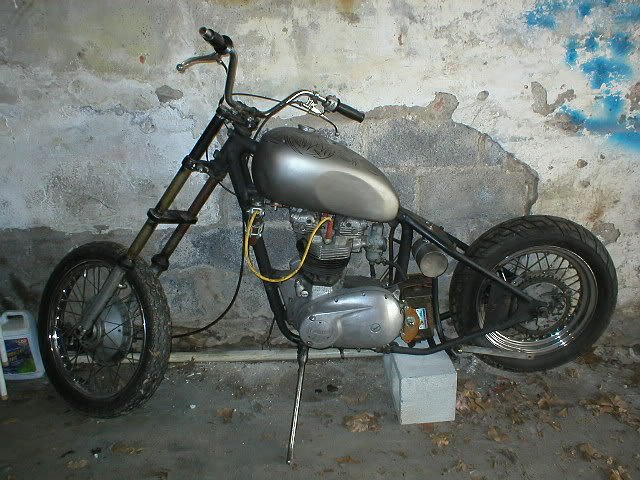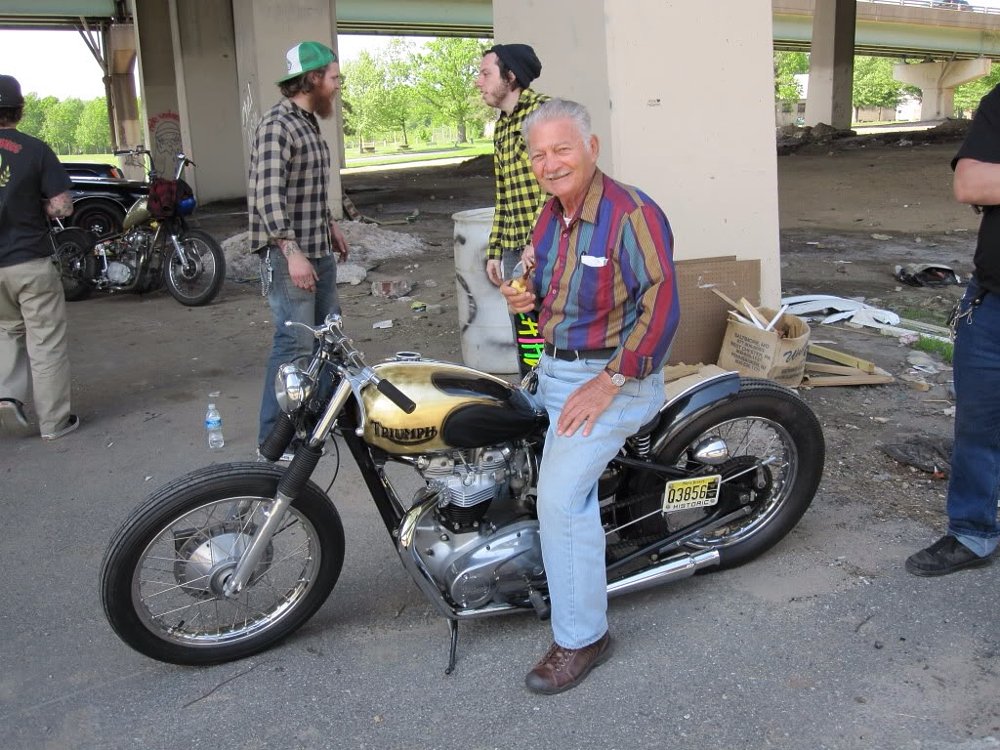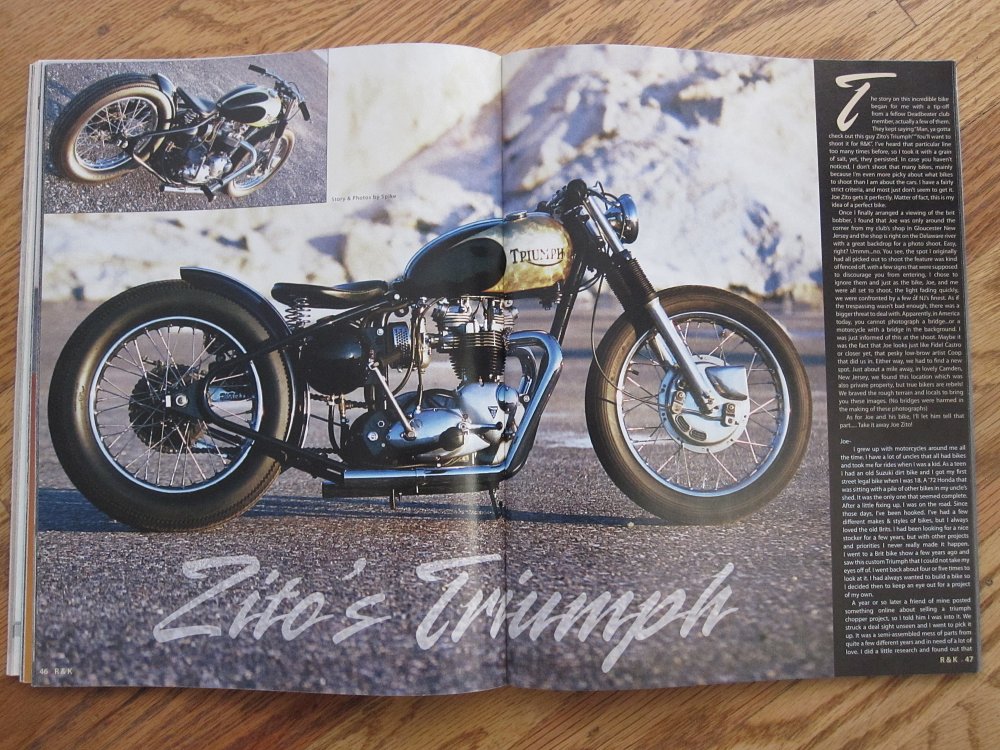I had always wanted a 1960s Triumph. I grew up in a family full of Harleys and Japanese bikes, so the British bikes stood out to me as really special. If they were cool enough for Brando and The Fonz, they were certainly cool enough for me.
I liked that Triumph's history was steeped in not only “show” but also “go.” In early 2006, I picked up a title-less, rolling basket-case Triumph from a friend for $600. I proudly showed my uncle Frank pictures of my new project and got my first dose of tough love.
“Oh boy," he said. "What a piece of shit. Old Triumphs are the worst, even when they are together and running!”
Feeling a little burned by my beloved uncle I thought, “Oh yeah? Challenge accepted!”
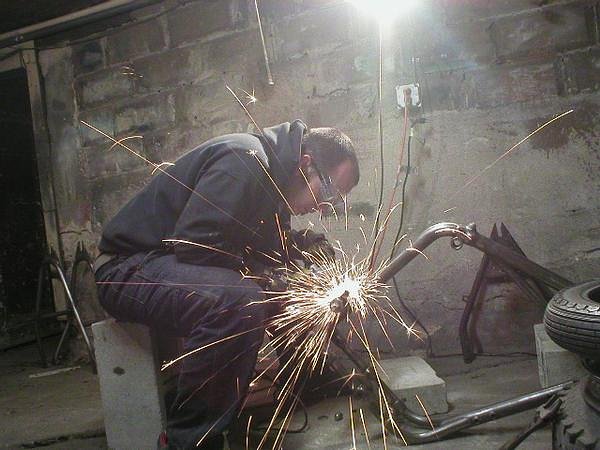
The project
Once I got it home, I realized most of the pile I bought was pretty useless. The hardtail frame was bent and cracked, the gas tank was from a later oil-in-frame and didn’t fit the early frame, and the rear axle was too small for the dropouts. I went on jockeyjournal.com to get some advice from other guys who had built bikes like this before. I guess I was sort of freaking out that the project was much harder than I expected and someone replied, “Man, if you’re already feeling like it’s too hard, just sell it now ‘cuz it ain’t gonna get any easier.” This was the turning point — I needed to roll up my sleeves and just do what had to be done.
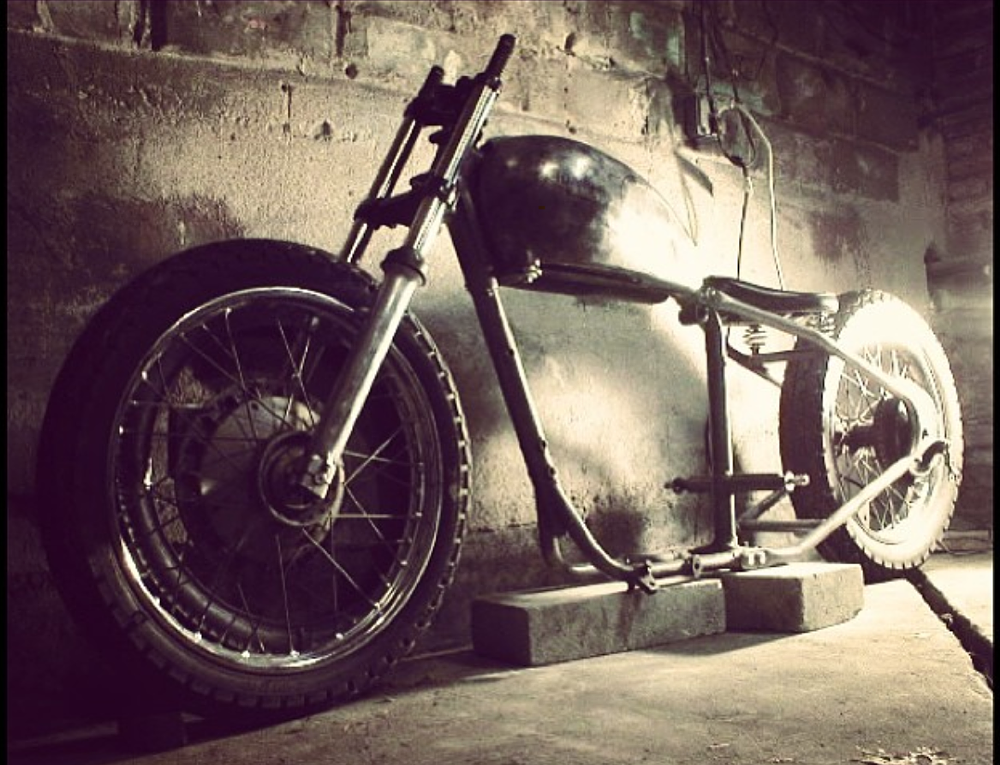
I ended up only keeping the front half of the frame, the fork lowers, and the motor. I had to cut the old hardtail off and reshape the frame so it could accept the new tail section. I hired a local Triumph guru to help me with the motor rebuild. I learned all about sludge traps and positive-ground electrical systems.
It turned out that the motor was made up of three different motors with mismatched cases and a later TR6 single-carb top end. Thankfully, it had some mystery hopped-up cams in it that really come in strong up high in the rpm. I kept the ‘72 front end and twin-leading-shoe front brake, since I really dig the big air scoop. I lowered the front end three inches to get the bike to sit nice and low with the four-inch stretch and two-and-a half inch drop tail. I re-laced the wheels with OEM 18-inch and 19-inch Dunlop rims and an earlier rear hub. I scored a slimline Bonnie gas tank that looked much better than the oil-in-frame tank and fit the frame perfectly.
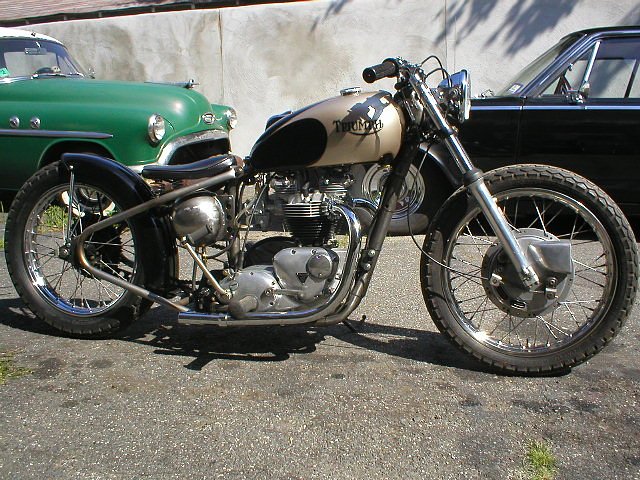
The bike really started to take shape and looked like the early show and go, street-strip Triumphs that I always thought were the epitome of cool. I scored a Unity spotlight at a car show and used it for the headlight and made the tail light out of a ‘37 Ford lens and bezel in conjunction with a ‘50s Schwinn headlight. The oil tank is an industrial float for an underground storage tank. The engine-turned gold leaf was actually inspired by the lettering on a dump truck I saw stuck in traffic on the way home from a trip to Boston, where I'd proposed to my wife a few days earlier.
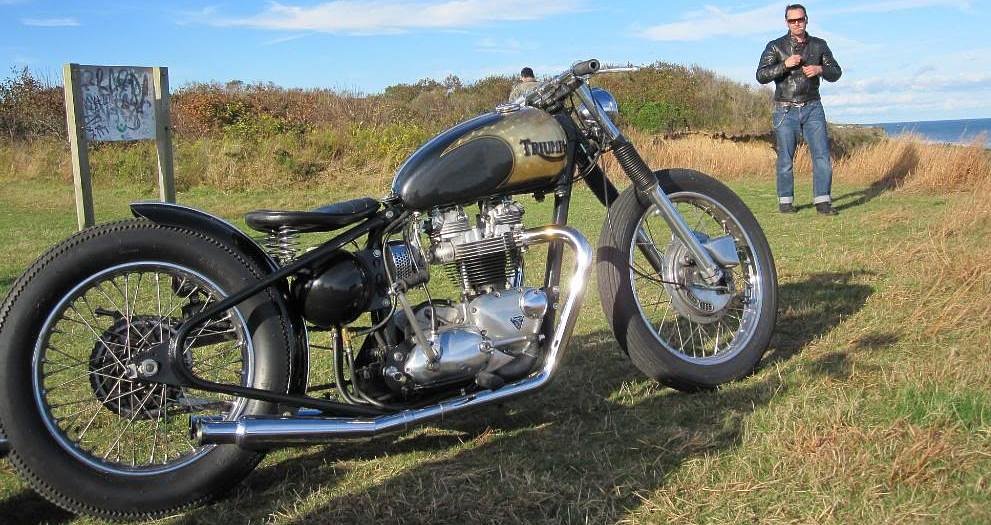
I initially ran the bike without mufflers but honestly it was way too loud. The cocktail shakers sounded great and brought some power back to the lower rpm range. I put a 20-tooth front sprocket on it so it’s geared to hang with highway traffic, despite the four-speed transmission. It does not have a tach or speedo but I have paced friends on modern bikes and it will “do the ton,” as the Brits like to say. Friends hated riding with me when I first got the bike on the road because I would get stopped by older guys that “had one just like it” and even little kids who were drawn in by its small and unusual look. As a result, gas stops would sometimes take an hour.
The magazine
In 2008, I was contacted by a friend of a friend called “Spike” who wanted to shoot the bike for Traditional Rod & Kulture magazine. I was really blown away — what an honor! I was never very great in school, aside from my favorite classes: metal fabrication, auto shop, and drafting. I was also never involved in any organized sports, since I was more into bikes and skateboarding growing up. This was the first time I actually felt like I was good enough at something for other folks to notice. Once the magazine was printed with my bike as a centerfold model, I rode down to my uncle Frank’s place with it.
“How’s this for a piece of shit, Frank?” I asked. He was really impressed and obviously very proud. He taught me a lot about working on vehicles and I really looked up to him. He’s since passed, but I always keep him in mind whenever I am working on anything mechanical.
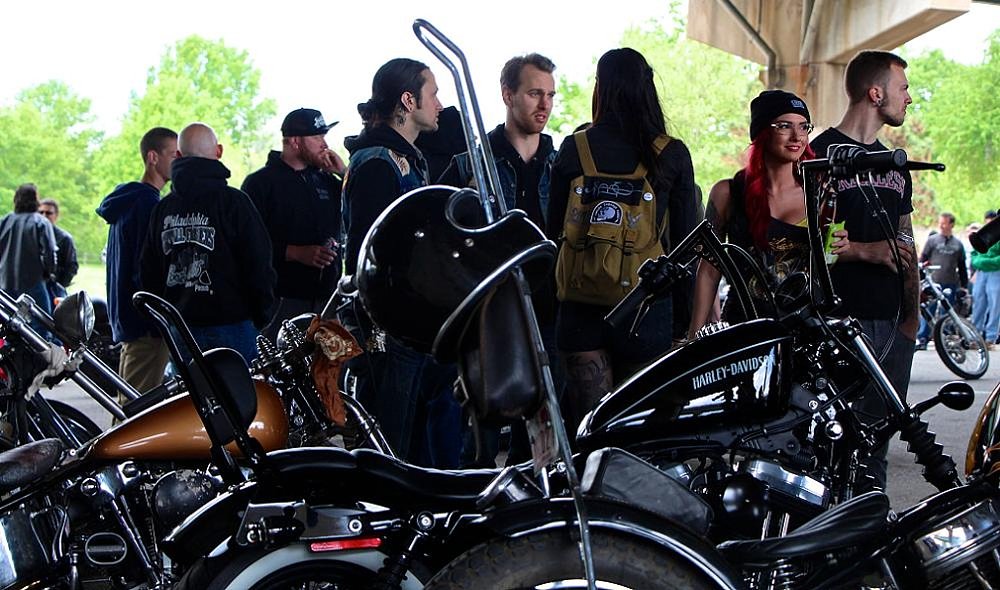
The event
I met some other folks who built their own custom bikes on the jockeyjournal forum and I decided to create an event called “Ride to Skate” at FDR skatepark, which is, ironically, right around the corner from RevZilla. It was always a laid-back, free event that gave us the chance to check out each other’s bikes and do a little skateboarding. It grew exponentially every year until the lot was so packed that bikes were spilling out into the street. I met a lot of great friends, including the ones who later on helped me get a job here at RevZilla.
I ended “Ride to Skate” after 10 years, but not before the event was featured in some magazines and even here on Common Tread. It was always really mind-blowing to look at all of the people having a blast and all the wild custom bikes at FDR and thinking it all started with this little 650 Triumph.
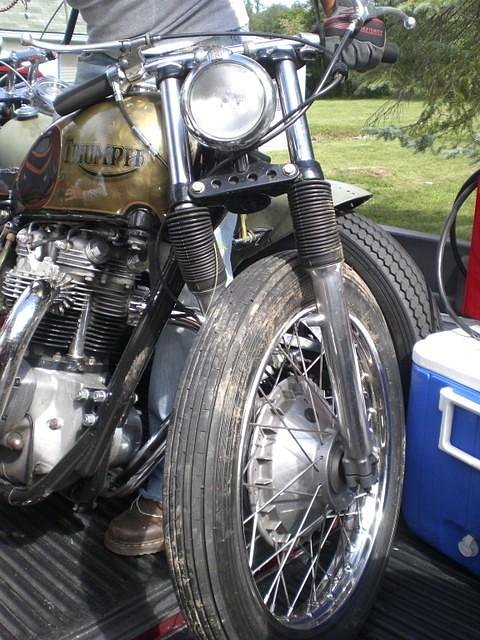
The big crash
Throughout the “Ride to Skate” years, a lot of other things happened with this old Triumph. The Gypsy Run was an event aimed at similar machines which was basically a few days of camping and riding on old janky bikes. I met a lot of great folks on the first one in 2007 and returned in ‘08 for more fun. I had just gotten married a few months prior and my wife was and is always supportive of all my moto-related trips.
Well, I was chasing my bud Fritz through some seriously twisty roads in New York state. He was on a relatively stock ‘68 Sportster and I was on my custom Triumph. The trouble with the Triumph versus the Harley is that the original Triumph footpegs do not fold up like the Harley’s. I got used to dragging my pegs in the corners but one really tough one in particular caught me off guard. It was a downhill blind right hander with a decreasing radius so I was already grinding the right peg down when the turn tightened up and I went off the road into a drainage ditch full of big rocks and car parts from previous wrecks. The ambulance driver said, “Oh yeah, we pull people outta this ditch all the time. See that new section of fence up there? That’s from people going through it. We’re surprised you made it this far around the corner. Nice work!”
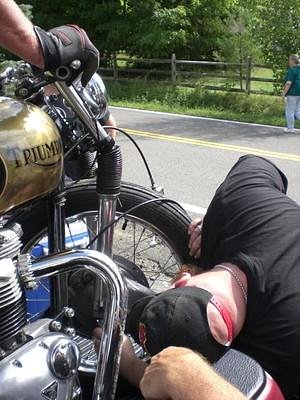
I’ve been riding since I was about five years old and had my fair share of crashes, but this was my first big one. A friend who was following me said the bike was about 15 feet in the air doing front flips and he didn’t see me at all. Some friends pulled me up out of the ditch and laid me on my back. I could not move my right leg. I noticed a burning feeling in my hip and looked down to see my hip bone through a giant hole in my flesh. No good.
Of course I was more worried about my bike but my buds had already scooped it up and put it in a truck that was headed to camp. Surprisingly, just the fork and the pipes were wrecked. Even the front wheel was fine and is still on the bike to this day.
My new wife and her mom came up to get me from the hospital, not knowing I would be there for several days recovering from surgery. The docs initially thought I shattered my pelvis, but apparently I just broke a piece off of it and it was not a big deal, but I did sever a muscle very badly and they had to put me back together. My wife took care of me for over a month as I recovered. She did not and still has not ever implied that she expects me to give up riding. The old Triumph showed me I chose the right person to be my wife.
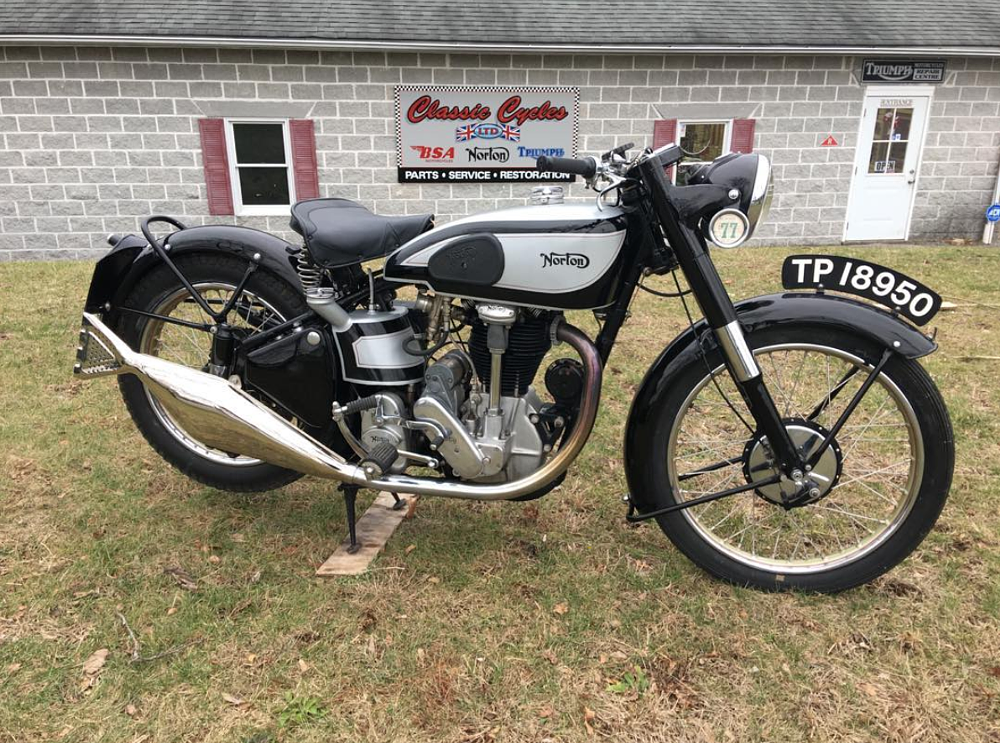
Professional mechanic?
I got pretty good at working on the bike since I was riding it so much. I learned its weak points and felt pretty in-tune with it. It needed a fresh top end around 2009 so I got hooked up with Dave at Classic Cycles in Frenchtown, New Jersey. He said he had cylinders, pistons, and good heads ready to go. He would take my worn out top end in exchange for the fresh one plus some dollars and offered to let me do the job in his shop, in case I ended up needing anything else. So I rebuilt the top end and had the bike running again before lunch.
“Man if you can build a bike like that and you can do a top end that quick, I could use your help around here,” Dave said. They used to say “A Triumph makes a mechanic out of any man,” and I am living proof: I ended up working at Classic Cycles both part-time and full-time for years and I still lace wheels for Dave whenever I can.

Entrepreneur
Fast forward a couple years. I was working full-time as a building inspector and was not happy with all the traveling and unpredictable hours. I had enough motorcycle work on the side to keep me plenty busy so I decided to go for it full-time. I started “Zito’s Vintage Cycle” and soon I had more work than I could ever imagine. I specialized in pre-1980 British and American bikes but happily worked on classic Japanese bikes, as well. I am forever grateful for all my customers and friends that kept the work flowing through my shop. I got a chance to build some amazing bikes during those years and met a lot of awesome people. I generated enough loot to keep up with the bills and never had to take out a loan.
I also found out that I, like many other independent business owners, am my own worst boss. The wrenching part of the job was the best — it was the accounting, bookkeeping, marketing and running around for parts and tools that just added up to be a bit much for one guy. There are just not enough hours in a day. Though I had a great helper, Adam, toward the end, I was honestly already burned out.
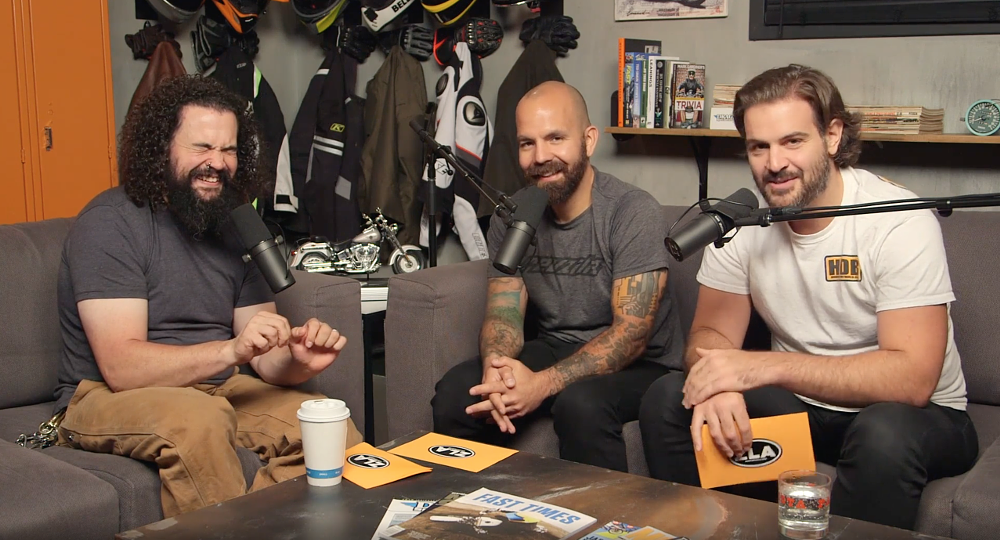
RevZilla
I had been friends for years with a fellow old-bike enthusiast, Mike Clarke. He had played a huge part in the success of “Ride to Skate.”
He was working at RevZilla and said, “Hey man, you can have a motorcycle job that has benefits, paid time off, and most importantly, steady paychecks.” I swallowed my pride, closed my shop, and thankfully landed a fulfilling and challenging “motorcycle job” here at RevZilla. Four years in, I’ve been a customer service rep, a video production coordinator, motorcycle fleet manager, and now a video host and writer.
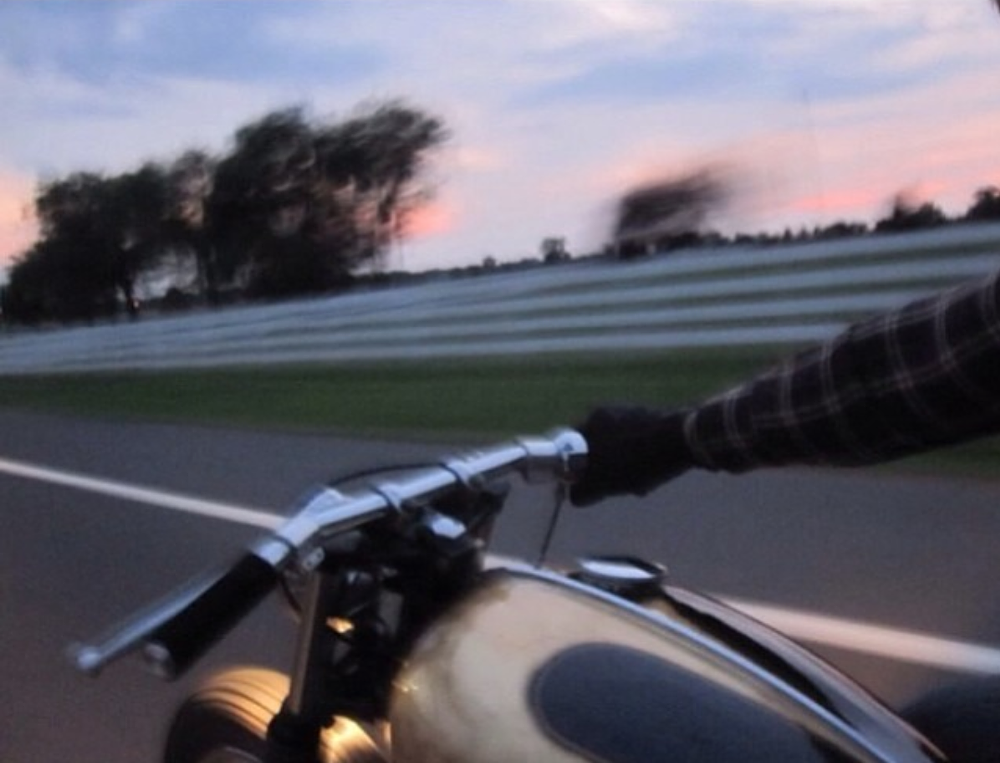
This little old basket-case Triumph has taught me a lot over the years: patience, perseverance, and Whitworth fastener sizes, to name a few.
Without the confidence and wrenching experience the old Triumph gave me over the years, I would have never learned that I could run my own vintage cycle shop. The Triumph has evolved along with my career and life, each step of the way. Most of all, it made me who I am today.

 Membership
Membership


